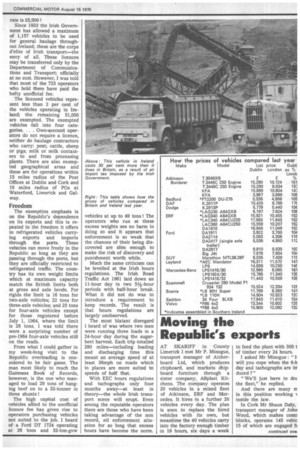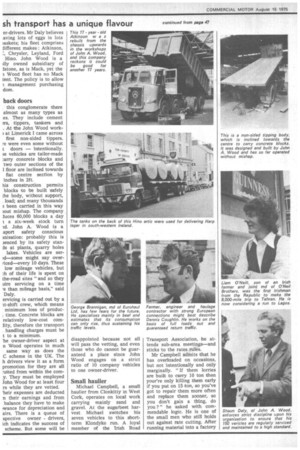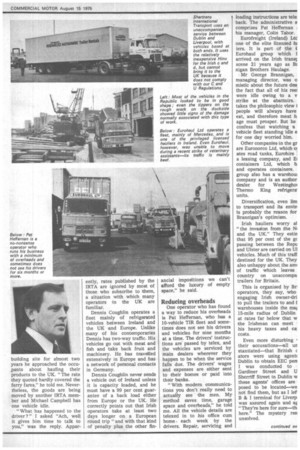Moving the Republic's exports
Page 49

Page 50

Page 51

If you've noticed an error in this article please click here to report it so we can fix it.
AT SKARIFF in County Limerick I met Mr P. 1V1inogue, transport manager of Aicherboard Ltd, Which produces chipboard, and markets chipboard furniture through a sister company, Allplast Kitchens. The company operates 20 vehicles in a mixed fleet of Atkinson, ERF and Mercedes. It hires in a further 20 vehicles every day. The plan is soon to replace the hired vehicles with its own, but meantime the 40 vehicles carry into the factory enough timber in 18 hours, six days a week to feed the plant with 300 t of timber every 24 hours.
I asked Mr Minogue : "F will you cope when the 8-h day and tachographs are in duced ?"
"We'll just have to dot the fleet," he replied.
And there are many n1 in this position working inside the law.
In Cork Mr Shaun Daly, transport manager of John Wood, which makes cone] blocks, operates 145 vehic 15 of which are engaged fi er-drivers. Mr Daly believes eying lots of eggs in lots )askets; his fleet comprises different makes : Atkinson, ;, Chrysler, Leyland, Ford Hino. John Wood is a rlly owned subsidiary of istone, as is Mack, yet the Wood fleet has no Mack tent. The policy is to allow management purchasing dom.
back doors
this conglomerate there almost as many types as es. They include cement .?rs, tippers, tankers and . At the John Wood work) at Limerick I came across first non-sided tippers. re were even some without doors — intentionally. 3e vehicles are tailor-made ;arry concrete blocks and two outer sections of the 1 floor are inclined towards flat centre section by inches in 2ft.
his construction permits blocks Ito be built safely :he body, without support, load; and many thousands been carried in this way lout mishap. The company duces 60,000 blocks a day a six-week stock turn id. John A. Wood is a sport safety conscious misation: probably this is lenced by its safety stan ds at plants, quarry holes lakes. Vehicles are ser!cl—some might say over riced—every 10 days. These low mileage vehicles, but :h of their life is spent on the-road sites "and so 'they uire servicing on a time -e than mileage basis," said Daly.
ervicing is oarried out by a it-shift crew, which means minimum loss of producL time. Concrete blocks are relatively low-cost cornlity, therefore the transport handling charges must be t to a minimum.
he owner-driver aspect at n Wood operates in much same way as does the C scheme in the UK. The h drivers view it as a form promotion for they are all -uited from within the corn.y. They must be employed John Wood for at least four rs while they are vetted. heir expenses are deducted n their earnings and from balance they have to make wance for depreciation and airs. There is a queue of spective owner drivers, 'oh indicates the success of scheme. But some will be disappointed because not all will pass the vetting, and even those who do cannot be guaranteed a place since John Wood engages on a strict ratio of 10 company vehicles to one owner-driver.
Small haulier
Michael Campbell, a small haulier from Clonkitty in West Cork, operates on local work carrying mainly sand and gravel. At the sugarbeet harvest Michael switches his seven vehicles to this shortterm Klondyke run. A loyal member of the Irish Road Transport Association, he attends sub-area meetings—and sticks to the rates rules.
Mr Campbell admits that he has overloaded on occasions, but not intentionally and only marginally. "If them lorries are built to carry 10 ton then your're only killing them early if you put on 15 tan, so you've got to repair them more often and replace them sooner, so you don't gain a thing, do you ? " he asked with commendable logic. He is one of 'the small men who still holds out against rate cutting. After running material into a factory building site for almost two years he approached the occupants about hauling their products to the UK. "The rate they quoted hardly covered the ferry fares," he told me. Nevertheless, the goods are being moved by another IRTA member and Michael Campbell has one vehicle idle.
"What has happened to the driver ? " I asked "Ach, well it gives him time to talk to you," was the reply. Appar ently, rates published by the IRTA are ignored by most of those who subscribe to them, a situation with whiCh many operators in the UK are familiar.
Dennis Coughlin operates a fleet mainly of refrigerated vehicles between Ireland and the UK and Europe. Unlike many of his contemporaries Dennis has two-way traffic. His vehicles go out with meat and fish and take back fruit and machinery. He has travelled extensively in Europe and has a network of personal contacts in Germany.
Dennis Coughlin never sends a vehicle out of Ireland unless it is capacity loaded, and he must have a 99 per cent guarantee of a back load either from Europe or the UK. He correctly points out that Irish operators take at least two days longer on a European round trip "and with that kind of penalty plus the other fin ancial impositions we can't afford the luxury of empty space," he said.
Reducing overheads
One operator who has found a way to reduce his overheads is Pat Heffernan, who has a 10-vehicle TIR fleet and sometimes does not see his drivers and vehicles for nine months at a time. The drivers' instructions an passed by telex, and the vehicles are serviced by main dealers wherever they happen to be when the service falls due. The drivers' wages and expenses are either sent to their homes or paid into their banks.
"With modern communications you don't really need to actually see the men. My method saves time, garage space and 'overheads," he told me. All the vehicle details are telexed in to his office cum home each week by the drivers. Repair, servicing and loading instructions are tele: back. The administrative s comprises Pat Heffernan his manager, Colin Tabor.
Eurofreight (Ireland) Ltd one of the elite licensed hi iers. It is part of the f Eurohaul group which f arrived on the Irish trans scene 21 years ago as Br nigan Brothers Haulage.
• Mr George Brannigan, managing director, was o mastic about the future deal the fact that all of his read were idle owing to a v strike at the abattoirs. takes the philosophic view 1 people will always have eat, and therefore Meat h age must prosper. But he confess that watching 'a vehicle fleet standing idle e for one day worried him.
Other companies in the gr are Euronorco Ltd, which oj ates road tanks, Eurohire a leasing company, and Ei containers Ltd, which h and operates containers. group also has a warehou: company and is an author dealer for Westinghoi Thermo King refrigera units.
Diversification, even lim to transport and its emir is probably the reason for Brannigan's optimism.
Irish hauliers worry at "the invasion from the NI and the UK." They ,estin that 95 per cent of the gc passing between the Repu and Ulster are carried on Ul vehicles. Much of this traff destined for the UK. They also unhappy about the am( of traffic which leaves country on unaccompa trailers for Britain.
This is organised by Bri operators, they say, who engaging Irish owner-dri to pull the trailers to and f warehouses inside the mai 15-mile radius of Dublin at rates far below that w the Irishman can meet his heavy taxes and car costs.
Even more disturbing their accusations—all us stantiated—that British c ators were using agent: Dublin to obtain EEC pen I was condudted to Gardiner Street and U Sherriff Street in Dublin w these agents' offices are posed to be located—we not find them, but as I lef B & I terminal for Liverp was assured again and ag "They're here for sure—th here." The mystery ren unsolved.




































































































